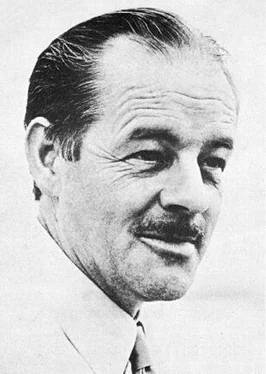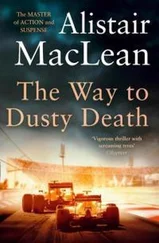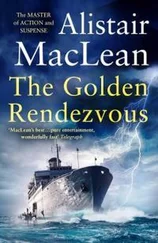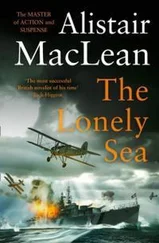He tried to speak, but only a croak came out. He wet his lips and said: ‘Colombia.’
‘However did you know, I wonder? That’s it, Colombia. They arranged to get a couple of secondhand destroyers from Britain, some frigates, mine sweepers and gunboats from the United States. Considering that those second-hand ships were almost brand new, they got them dead cheap: 10,250,000 dollars. But then the snag: Colombia was in a state of threatened revolution, civil war and anarchy, the value of the peso was tumbling abroad and Britain and the United States, to whom a combined payment was to be made, refused to deliver against the peso. No international bank would look at Colombia. So it was agreed that the payment be made in kind. Some previous government had imported, for industrial purposes, two million dollars’ worth of uncut Brazilian diamonds which had never been used. To that was added about two and a half million dollars’ worth of Colombian gold, near enough two tons in 28-lb ingots: the bulk of the payment, however, was in cut emeralds – I need hardly remind you, Vyland, that the Muzo mines in the Eastern Andes are the most famous and important source of emeralds in the world. Or perhaps you know?’
Vyland said nothing. He pulled out his display handkerchief and mopped his face. He looked sick.
‘No matter. And then came the question of transport. It was supposed to have been flown out to Tampa on its first leg, by an Avianca or Lansa freighter but all the domestic national airlines were temporarily grounded at the beginning of May, 1958, when the new elections were coming up. Some members of the permanent civil service were desperately anxious to get rid of this money in case it fell into the wrong hands, so they looked around for a foreign-owned freight airline operating only external flights. They picked on the Trans-Carib Air Charter Co. Lloyd’s agreed to transfer the insurance. The Trans-Carib freighter filed a false flight plan and took off from Barranquilla, heading for Tampa via the Yucatan Strait.
‘There were only four people in that plane, Vyland. There was the pilot, a twin brother of the owner of the Trans-Carib Line. There was the co-pilot, who also doubled as navigator, and a woman and a small child whom it was thought wiser not to leave behind in case things went wrong at the elections and it was found out the part played by the Trans-Carib in getting the money out of the country.
‘They filed a false flight plan, Vyland, but that didn’t do them any good at all for one of those noble and high-minded civil servants who had been so anxious to pay the debt to Britain and America was as crooked as they come and a creature of yours, Vyland. He knew of the true flight plan, and radioed you. You were in Havana, and you’d everything laid on, hadn’t you, Vyland?’
‘How do you know all this?’ Vyland croaked.
‘Because I am – I was – the owner of the Trans-Carib Air Charter Co.’ I felt unutterably tired, I don’t know whether it was because of the pain or the foul air or just because of the overwhelming sense of the emptiness of living. ‘I was grounded at Belize, in British Honduras, at the time, but I managed to pick them up on the radio – after they had repaired it. They told me then that someone had tried to blow up the plane, but I know now that wasn’t quite true, all they had tried to do was to wreck the radio, to cut the DC off from the outer world. They almost succeeded – but not quite. You never knew, did you, Vyland, that someone was in radio contact with that plane just before it was shot out of the sky. But I was. Just for two minutes, Vyland.’ I looked at him slowly, consideringly, emptily. ‘Two little minutes that mean you die tonight.’
Vyland stared at me with sick terror in his eyes. He knew what was coming all right, or thought he knew: he knew now who I was, he knew now what it was to meet a man who had lost everything, a man to whom pity and compassion were no longer even words. Slowly, as if at the expense of great effort and pain, he twisted his head to look at Royale, but, for the first time ever, there was no comfort, no security, no knowledge of safety to be found there, for the incredible was happening at last: Royale was afraid.
I half-turned and pointed at the shattered cabin of the DC.
‘Take a good look, Vyland,’ I said quietly. ‘Take a good look at what you’ve done and feel proud of yourself. In the captain’s seat – that skeleton was once Peter Talbot, my twin brother. The other is Elizabeth Talbot – she was my wife, Vyland. In the back of the plane will be all that’s left of a very little boy. John Talbot, my son. He was three and a half years old. I’ve thought a thousand times about how my little boy died, Vyland. The bullets that killed my wife and brother wouldn’t have got him, he’d have been alive till the plane hit the water. Maybe two or three minutes, the plane tumbling and falling through the sky, Vyland, and the little boy sobbing and screaming and terrified out of his mind, and his mother not coming when he called her name. When he called her name over and over again. But she couldn’t come, could she, Vyland? She was sitting in her seat, dead. And then the plane hit the water and even then, perhaps, Johny was still alive. Maybe the fuselage took time to sink – it happens that way often, you know, Vyland – or had it air trapped inside it when it sank. I wonder how long it was before the waters closed over him. Can’t you see it, Vyland, three years old, screaming and struggling and dying and no one near him? And then the screaming and struggling stopped and my little boy was drowned.’
I looked out at the smashed plane cabin for a long time, or what seemed like a long time, and when I turned away Vyland caught my right arm. I pushed him off and he fell on the duckboard floor, staring up at me with wide, panic-stricken eyes. His mouth was open, his breathing coming in quick, harsh gasps, and his entire body was trembling. Royale was still in control of himself, but only just: ivory knuckled hands rested on his knees and his eyes were moving constantly about the observation chamber, a hunted animal seeking a way to escape.
‘I’ve waited a long time for this, Vyland,’ I went on. ‘I’ve waited two years and four months and I don’t believe I’ve ever thought for five minutes about anything else in all that time.
‘I’ve nothing left to live for, Vyland, you can understand that. I’ve had enough. I suppose it’s macabre, but I’d kind of like to stay here beside them. I’ve stopped kidding myself about the point in carrying on living. There’s none, not any more, so I might as well stay here. There’s no point now, because all that’s kept me going was the promise I made myself on the third of May, 1958, that I’d never rest again till I’d sought out and destroyed the man who had destroyed life for me. That I’ve done, and there’s no more now. It should spoil it for me, I suppose, the thought that you’ll be here also, but on the other hand I suppose it’s kind of fitting. The killers and their victims, all together in the end.’
‘You’re mad,’ Vyland whispered. ‘You’re mad. What are you saying?’
‘Only this. Remember that electrical switch that was left on the table? The one you asked about and I said “We won’t be needing that any more”? Well we won’t. Not any more. That was the master control for the ballast release switches and without it the ballast release is completely jinxed. And without releasing ballast we can never rise again. Here we are, Vyland, and here we stay. For ever.’
The sweat poured down our faces in rivulets. The temperature had risen to almost 120° Fahrenheit, the air was humid and now almost indescribably foul. Our hoarse rasping gasps as we fought for oxygen was the only sound in that tiny steel ball resting on the floor of the Gulf of Mexico, 480 feet below the level of the sea.
Читать дальше
Конец ознакомительного отрывка
Купить книгу












